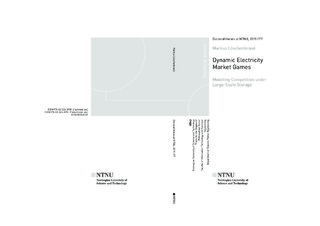| dc.contributor.advisor | Korpås, Magnus | |
| dc.contributor.author | Löschenbrand, Markus | |
| dc.date.accessioned | 2020-02-14T09:10:59Z | |
| dc.date.available | 2020-02-14T09:10:59Z | |
| dc.date.issued | 2019 | |
| dc.identifier.isbn | 978-82-326-3951-9 | |
| dc.identifier.issn | 1503-8181 | |
| dc.identifier.uri | http://hdl.handle.net/11250/2641689 | |
| dc.description.abstract | Electricity shows similar characteristics to traditional commodity goods which led to the market mechanisms to trade electricity being developed in similar manner to markets for other commodities. Kirchho's laws, however, require a constant equilibrium state, as supply surplus or decit is not physically possible in electricity systems. Thus, flexibility in ramping and startups/shutdowns of generation units is a key characteristic that is topic of vast literature on power systems. Competition models, however, have traditionally been focused on representative points in time. Transitions between those time periods have been either approximated or neglected, in order to reduce model complexity and allow for practical applications. The same goes for decisions in-between those time stages. However, as shown by examples such as the Bellmann equations, future decisions can and often will have implications on current periods.
In changing systems with decreasing prices and marginal cost, cost factors associated with discontinuous decisions will grow in importance. In electricity systems, these discontinuous decisions are mostly occupied with intertemporal decisions. Therefore, traditional models from game/equilibrium theory might not be t for these future applications.
In this dissertation and the presented publications, a novelty in literature is presented: the state decisions of storing inventory and dispatching units are considered in single-level competitive games. This allows for previously ignored applications, such as assessing the strategic impact of dispatch decisions on market prices and electricity storage. In systems with decreasing shares of peak-units and increasing uncertainty, such models could prove key to assessing functionality of market designs and existence of market power.
Various other solution methods for equilibrium models beyond the traditional approach of deriving the Karush-Kuhn-Tucker conditions are described and successfully applied within the work of this dissertation. These include Nikaido-Isoda convergence algorithms and Gröbner basis formulations. Approximation techniques are used, either through analytical approaches or dynamically via metaheuristics.
Due to non-convexity in the presented interaction models, traditional views on the characteristics of Nash equilibria are reconsidered and redefined. Accurate mapping of these potential outcomes might prove crucial in practical applications, where the results for individual players might vary depending on the equilibrium solution. Thus, analysis on multiple Nash equilibria was provided, in order to display the characteristics of the problem accurately.
Further, various applications were introduced. A focus on reserve markets/ancillary services was chosen based on the assumptions of flexible units being the key players in such.
Different, modular methodologies were proposed. This allows for using parts of the model individually and potentially combining them with parts of the other presented models.
Due to most large-scale storage being provided by hydropower, a focus on realistic examples from this field was chosen. This also resulted in analyzing the modeling of uncertainty, due to the strong dependency of hydropower on natural forces such as precipitation. Formulation of uncertainty in equilibrium models was chosen to be mainly focused on robust/(weighted) interior point methods.
These main findings and contributions are meant to contribute to future research on the topic of non-convex multistage games under storage. Due to the complexity/NP-hardness of the problem, the presented methods - even though well performing - can be considered only a starting point for future studies on the here presented novel problem setup. | |
| dc.language.iso | eng | nb_NO |
| dc.publisher | NTNU | nb_NO |
| dc.relation.ispartofseries | Doctoral theses at NTNU;2019:177 | |
| dc.relation.haspart | Paper 1:
Markus Löschenbrand, Xiaomei Cheng, Magnus Korpås,
Exercising Market Power under Marginal Cost Bidding: the
Future Development of European Power Market | |
| dc.relation.haspart | Paper 2;
Löschenbrand, Markus.
Finding multiple Nash equilibria via machine learning-supported Gröbner bases. European Journal of Operational Research 2020
https://doi.org/10.1016/j.ejor.2020.01.041 | |
| dc.relation.haspart | Paper 3:
Löschenbrand, Markus; Wei, Wei; Liu, Feng.
Hydro-thermal power market equilibrium with price-making hydropower producers. Energy 2018 ;Volum 164. s. 377-389
https://doi.org/10.1016/j.energy.2018.08.162 | |
| dc.relation.haspart | Paper 4:
Löschenbrand, Markus; Korpås, Magnus.
Multiple Nash Equilibria in Electricity Markets with price-making Hydrothermal Producers. IEEE Transactions on Power Systems 2019 ;Volum 34.(1) s. 422-431
https://doi.org/10.1109/TPWRS.2018.2858574 | |
| dc.relation.haspart | Paper 5:
Löschenbrand, Markus.
Market Power in a Hydro-Thermal System under Uncertainty. IAEE International Conference | |
| dc.relation.haspart | Paper 6:
Löschenbrand, Markus; Korpås, Magnus; Fodstad, Marte.
Market Power in Hydro-Thermal Systems with Marginal Cost Bidding. I: 2018 15th International Conference on the European Energy Market - EEM. IEEE conference proceedings
https://doi.org/10.1109/EEM.2018.8469984 | |
| dc.relation.haspart | Paper 7:
Löschenbrand, Markus; Farahmand, Hossein; Korpås, Magnus.
Impact of inertial response requirements on a multi area renewable network. I: 12th IEEE Power and Energy Society PowerTech Conference PowerTech Manchester 2017.
https://doi.org/10.1109/PTC.2017.7979748 | |
| dc.title | Dynamic Electricity Market Games – Modeling Competition under Large-scale Storage | nb_NO |
| dc.type | Doctoral thesis | nb_NO |
| dc.subject.nsi | VDP::Technology: 500::Electrotechnical disciplines: 540::Electrical power engineering: 542 | nb_NO |
| dc.description.localcode | digital fulltext is not avialable | nb_NO |
